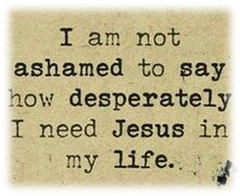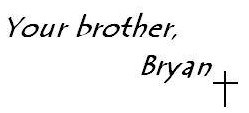
1
The Problem Is Myself,
by Earl Jabay
About twenty-five years ago, in a small Midwestern city, a group of young boys were playing baseball. It was a team tryout. Every boy was doing his best to impress the coach. Robbie was a catcher. Younger than the two other boys who were trying out for that position, he was, however, a real beaver. Nothing was more important to him than getting on the team. There was no question about his talent. He was good. Any spectator could see that he was better than the other two catchers.
Late in the afternoon, the coach called Robbie over to him. Robbie studied the coach’s eyes for some hint of acceptance. It was not there, but then, maybe the coach was hiding his feelings. The coach began talking about how much ability Robbie had and that he really gave a lot to the game. And then it came. “Robbie, I hate to have to tell you this, but I can’t use you.” It was like being hit on the head with a baseball bat. “But . . . why?” Robbie fought to hold back his tears.
“Robbie—two things. You’re not a team member. You never joined us. You play your game when you are out there. You are a good catcher—but a loner as a team member. “The second thing is that you have a problem with me. You play my part, coaching the players and taking over. We can’t have a ball club on that basis.” “But Coach!—I was only trying my best!” Coach reflected. “There’s more to it than that, Robbie.” You were a good ballplayer, but your enlarged ego moved you right out of the ball club. “Forget it!” cried Robbie, as he stormed off the ball field. “I wouldn’t be caught dead on your crummy team!” Even as you stormed off the field, you felt like a king. You told them you were too good for them.
When I met Robbie, he was a man in his late thirties who had recently been admitted to a mental hospital. Rob was severely suicidal. “I’ve been struggling against taking my life ever since I was a young boy. Death has somehow always had a fascination for me.” He was seated comfortably in my study, and I just let him talk. “I remember that old Ford I had just before I graduated from high school. One night I took it out to the edge of town and ran a piece of tubing from the exhaust, through the window, and into the car. Then I started up the engine. Somehow, it gave me wild excitement to see how close I could come to taking my life. I chickened out, as you can see.” He laughed hollowly. “Another time, I tried to see how close I could come to the concrete abutment of an overpass. The car was doing about fifty-five when I hit it. Two days later, I woke up in a hospital with a broken back which still gives me trouble.” I thought of all the highway deaths and wondered how many of them were, in reality, suicides. “This thing with death really frightens me.” He paused and shook his head. “Well, it does and it doesn’t. Right now, I really don’t want to kill myself. But when I get excited or things go wrong, the first thing I do is think about some weird plan to kill myself. I have literally hundreds of ways all worked out in my mind. The idea has a hold on me.
Many times, it’s almost as if a dark, brooding presence comes over me and I have no power over it. I don’t believe in the devil, but it’s like an evil power—I find myself absolutely powerless to resist it. That’s what brought me here. This time, I slashed my wrists. One part of me tells me I wanted to do it—another says I didn’t.” Rob went on to tell me what he had tried to do about his problem. “I spent years trying to figure out what kind of a nut I was to have these weird ideas. I became such a nervous wreck that I went to a psychiatrist for some tranquilizers. Thought maybe that would help.” He sighed and leaned back in his chair. “The doctor gave me some pills and suggested psychotherapy. I had already read a lot about it, so I began treatment. At the time, I claimed that it was doing a lot of good and that I was finally getting some answers. I think I had to say that to justify paying him all that money! After two years, I ran out of money—and patience. I came to know a lot about my past, but that old problem of suicide was more of a threat than ever.
“Next thing I did was go to a minister. Don’t get me wrong. I’m not religious, but I heard that this minister was a counselor, so I went to him. True, he didn’t say much about God, but he sure had a lot to say about his church. His congregation was very busy and active with all kinds of study groups and community-action programs, all of which I was invited to join. When I finally got to tell him about my problems, all I recall him saying was that I should make a decision not to kill myself, and that I should use more willpower. Oh yes, he said I should also pray. I was hoping he would pray with me, because I felt I really needed prayer, but he never suggested it. I quit going to see him.”
I looked at Rob’s face. Fatigue was written all over it. And despair. I felt pity for this man who had tried so hard to figure out why he was losing his battle against death. I sensed that Rob had a little more to say. “The only conclusion I can come to is that my biggest problem is myself. I am my own worst enemy!—always have been. I’m a double person—maybe I’m schizoid, I don’t know. I do and then I don’t want to kill myself. I don’t understand myself. I don’t even like myself. Worst of all, I can’t even control myself! For God’s sake, Chaplain, tell me what’s wrong with me!” he cried, putting his face in his hands. “Does any of this make any sense at all?”
I knew it was time to level with Rob. “Okay,” I said, keeping my voice low, “I’ll give it to you straight: you are absolutely right when you say that you are your biggest problem. And the problem with you, Rob, is that you are a god-player. What I mean is this: you have tried to create your own little world with yourself placed squarely in the center of it. God has no place in your world because you have taken His place. Your whole life is a story of how you tried to set things up according to your will and plans. You wanted to be a king and build yourself a kingdom. The truth is that you are not a god, not even a king—you are a plain, ordinary human being who has never joined the human race.” Rob was listening now, not moving a muscle. I went on. “That early episode on the ball field, in a sense, tells it all. Even then you tried to take over. You tried to take that ball club—coach and all—and make them serve you in the Kingdom of Robbie. I paused, catching my breath, but Rob remained speechless.
“Now, about this problem of suicide,” I continued. “Suicide is the ultimate act of god-playing—even though you never consciously intended it to be that. Look, when anyone attempts suicide, what does he do? He insists of having the world his way, and if he cannot have it his way, he will kill himself. The king in us would rather die than accept the world as it is. He has such a deep love for his kingship and such a strong faith in himself to bring it about, that any failure or weakness in himself must be punished with death.” Rob nodded. He didn’t like what he was hearing, but he seemed to see it was the truth, and he wanted to hear more. “The Kingdom of Self, understand, is in our heads. We spend years building this fantasy kingdom unto our own glory. The king’s thinking becomes grandiose and his feelings ultimate. He believes all things can and must be done according to his will. And another thing; the king is never wrong. He is always right. Just ask him. He’ll tell you. So when the castle really starts to fall down around his ears and the king has lost all control of the world in his mind, he will fly out of control unto his own destruction. Then the forces of self-hate and self-pity move in and become so strong that the king is powerless to withstand them. He does, therefore, what he does not want to do—he attempts to kill himself because he can’t stand himself, defeated phony king that he is. It’s not that he particularly wants to die; it’s just that there doesn’t seem to be any alternative with his kingdom in such terrible shape.” I glanced at my watch and realized I had only a few minutes before my next appointment. “One more thing before you go: you are a god-playing king. So am I. Everyone is. You failed as a king. I, too. We are both failures—in fact, we even failed to fail successfully. But we are still alive, thank God, and there is much hope for both of us. If you want to, come back this afternoon, and we’ll talk some more.”
Earl Jabay was a Christian therapist in 1950’s. He wrote a number of books, including “The Kingdom of Self” and “The God-Players.”













